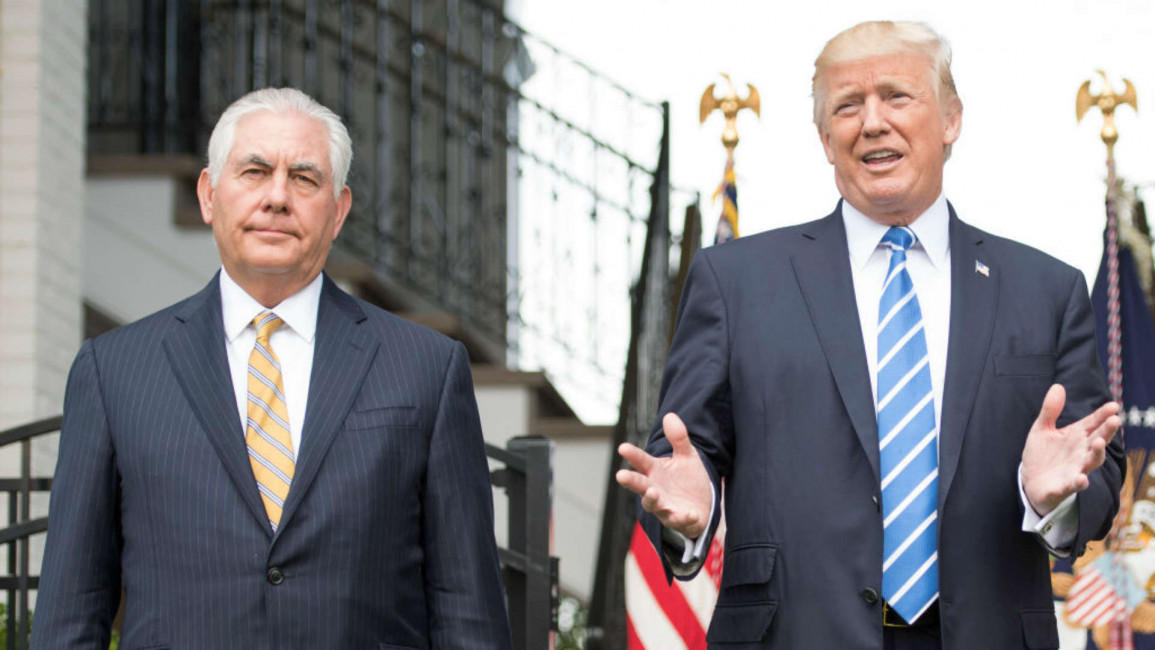
The cracks are beginning to show in Trump's administration
Factors contributing to this weakness are numerous, but three from the last month, stand out. The first, was President Donald Trump's widely condemned response to the violent Charlottesville demonstration by neo-Nazis and white supremacists.
The second was his pardoning of convicted Maricopa County, Arizona, Sheriff Joe Arpaio who had defied a court order to end his department's unconstitutional practices against minorities.
The third is the deepening crisis resulting from the congressional and independent counsel investigations into alleged collusion between the Trump campaign and Russia in last year’s presidential election.
Open defiance by officials
One manifestation of the administration's weakness is the defiance some top officials have shown towards Trump and his statements. The president has also received harsh criticism from members of Congress, Democrats and Republicans, as well as from civic leaders.
In a flagrant violation of the principle of loyalty to the president, Secretary of State Rex Tillerson tacitly criticised Mr Trump's position on Charlottesville and civil rights.
He unabashedly distanced himself from the president who, he said, "speaks for himself" when it comes to American values.
 |
The White House's Chief of Staff was visibly incredulous as the president defended individuals who marched alongside neo-Nazis and supremacists |  |
The White House's Chief of Staff, former General John Kelly, was visibly incredulous as the president defended individuals who marched alongside neo-Nazis and supremacists, calling them "good people". The two men reportedly do not see eye-to-eye on many issues, and Trump appears to believe Kelly is constraining him.
The Director of the National Economic Council in the White House, Gary Cohn, also let it be known that he thought hard about resigning from his position in protest over Charlottesville.
Secretary of Defense, James Mattis, called on the US military to hold fast to the importance of mutual respect between Americans. The chiefs of staff of the different armed services - historically loath to weighing in on political matters - tweeted simultaneous exhortations to their soldiers and declared their opposition to white nationalists.
Twitter Post
|
Mattis also handed the president a hidden defeat on 29 August. He announced that he will appoint a commission to study the implementation of a Trump directive on the process of banning transgender troops from the military. Such an action will simply put the new policy in limbo.
While many in the administration showed cowardice and refrained from decrying the president's stance, the positions taken by these key personnel indicate that deep fissures separate Trump from many of his lieutenants.
Weakening the foreign policy apparatus
Further indicating the administration's weakness, is Tillerson's eviscerating of the State Department's mission around the world. The department is in dire need of staffing, funding and improved morale.
In February, Tillerson began a review of his agency in an effort to downsize it. So far, he has left several pivotal positions vacant. Many ambassadorships are unfilled and diplomats sit in limbo not knowing what their next assignment will be.
 |
Many ambassadorships are unfilled and diplomats sit in limbo not knowing what their next assignment will be |  |
The secretary has imposed a temporary hiring freeze until he finishes his bid to re-organise, while Trump's budget office has announced a 30 percent cut in the department's budget. Notably, Tillerson has not objected to the cuts.
He has also decided to eliminate, re-assign or merge 36 of the 66 special envoy offices dealing with a range in international issues.
And as a sign of his penchant for limiting spending despite the negative impact on effectiveness, Tillerson recently announced that the US delegation to the upcoming United Nations meeting in New York will be severely trimmed.
Such a decision is likely to deprive the United States of an opportunity to make inroads with top officials from over 190 countries attending. That may dovetail with the White House's antipathy towards foreign relations; but it will surely downgrade America's position in the world.
Finally, Trump himself intimated recently that he is not in a hurry to fill many federal positions because he thinks many are redundant. Tellingly, he considered Russia's expulsion of American diplomats back in August as merely an occasion to save money.
…and the judiciary
If Congress and executive agencies and officials have begun to oppose President Trump openly, the judicial branch has not shied away from depriving his policies of legal sanction. The president's executive orders barring entry to people from six Muslim-majority countries have been bogged down in the courts.
In the latest development, the US Ninth Circuit Court of Appeals rejected the administration's argument that grandparents and other relatives are not recognised as family members for immigration purposes.
These and many other manifestations of defiance of the president and rejection of the administration's policies only lead to one conclusion: The Trump presidency looks seriously on the ropes.
Imad K. Harb is the Director of Research and Analysis at Arab Center Washington DC.
Opinions expressed in this article remain those of the author and do not necessarily represent those of The New Arab



